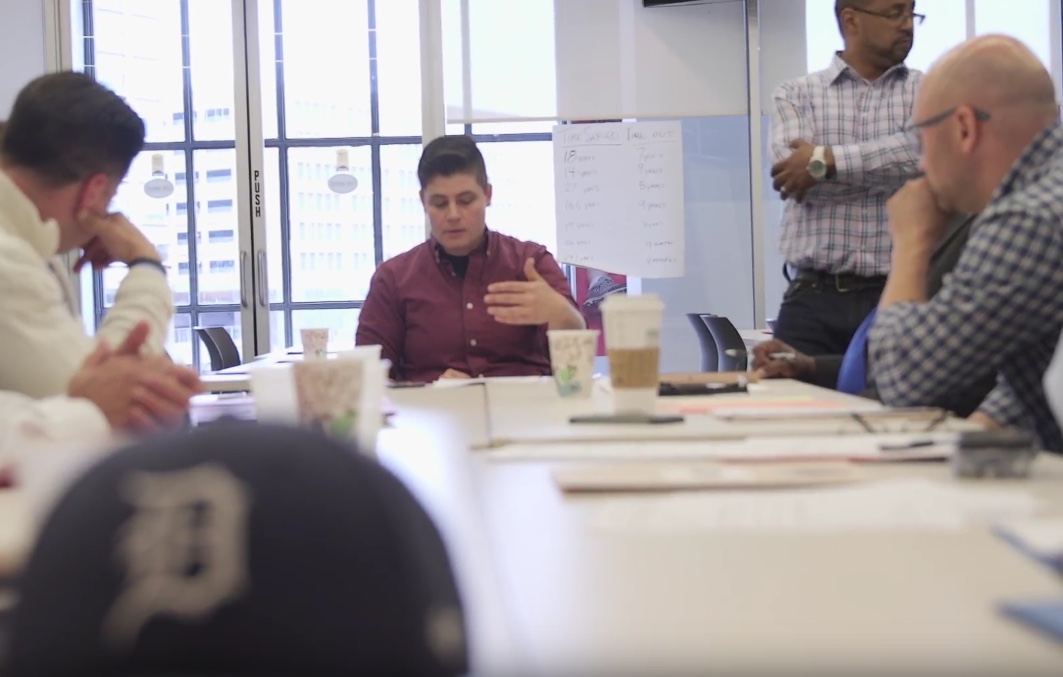
AFSC's Michigan Criminal Justice Program works to end death by incarceration. To learn more and hear from people sentenced to life or long prison sentences, read "Ending Perpetual Punishment: The case for commutations for people in Michigan prisons." Arnie Alpert / AFSC
For decades, the American Friends Service Committee (AFSC) and millions of activists, people of faith, and concerned citizens from around the globe have been calling for an end to capital punishment. These efforts have generated substantial progress – since the late ’90s, we have seen a steady decline in new death sentences in the U.S., as well as a decline in the number of people who have been executed.
Yet the struggle is far from over. Twenty-seven states still have not abolished this cruel punishment.
But there is another way that the U.S. sentences people to death – one that gets far less attention.
Around 206,000 people are serving life or virtual life sentences in the United States (a virtual life sentence is a sentence of 50 years or longer). More than 50,000 of those are serving life without the possibility of parole. These are sentences that condemn those who receive them to die behind bars. That is why many are now calling these sentences “death by incarceration.”
Felix Rosado, who is serving a death by incarceration sentence in Pennsylvania and who has long been active in restorative justice work, explains: “Death by incarceration is connected to the larger issue of this country’s banishment mindset, the idea that we can get rid of our problems by tossing them away somewhere where we no longer have to see or hear them. It’s an exclusionary way of thinking that is dominant in our education, economic, and other systems. At its core is the belief that certain segments of the population are unnecessary and thus expendable.”
The racism of the legal system is reflected even more dramatically when it comes to long sentences – two-thirds of the people serving death by incarceration are Black and Latino. Most people serving these sentences are poor. And death by incarceration tears apart families and communities, sending a message that no matter how much someone changes or accomplishes, they will never be allowed to set foot outside of prison.
Every human being has dignity, and everyone has the capacity to grow and change. Denying people the possibility of freedom not only tears apart already marginalized communities, it undermines our shared humanity.
It also exacerbates cycles of harm and violence. We only have to look to decades of failed “tough-on-crime” policies to see that we cannot incarcerate our way to a safer and more equitable society. Instead of spending millions of dollars every year subjecting people to the trauma of perpetual confinement, that money should be invested in things that actually create safe, healthy communities – education, medical and mental healthcare, jobs and job training, housing, community-based reentry, and transformative forms of justice that actually address the root causes of violence.
Fortunately, people across the country – both inside and outside of prison – are challenging the policies and mindsets that send people to prison for decades. Many states now have organizations advocating specifically for an end to death by incarceration and other long-term sentences, and we are beginning to see modest reforms to parole, sentencing, and commutation practices.
AFSC programs in Michigan, New York, Arizona, California, New Jersey, and elsewhere are all organizing in their respective states to end long-term incarceration.
But we are going to need people mobilizing on a far greater scale to successfully change these policies. And this requires rethinking how we understand and work toward justice, accountability, and healing.
I know from many years of doing anti-prison work, and the many currently and formerly incarcerated people who are my friends, colleagues, and collaborators, that our communities and this country would be much stronger if the thousands of people serving death by incarceration sentences were able to come home.
As the movement against perpetual punishment grows, I hope everyone who has worked tirelessly to end capital punishment will join us in the call to end death by incarceration in all its forms.